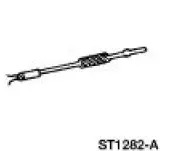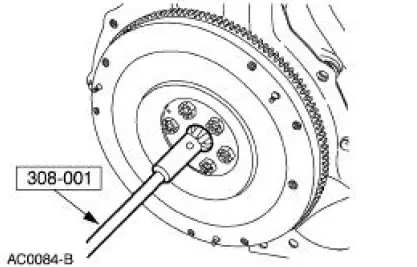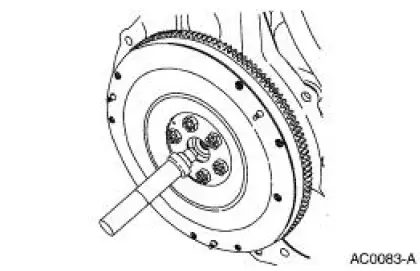Ford Mustang (1999-2004) Service Manual: Pilot Bearing
Special Tool(s)
 |
Puller with Slide Hammer 308-001 (T58L-101-B) |
1. Remove the clutch disc and the clutch pressure plate. For additional information, refer to Disc and Pressure Plate-3.8L and 4.6L (2V) Engines or Disc and Pressure Plate-4.6L (4V) Engine in this section.
2. Using the special tool, remove the pilot bearing from the flywheel.

Installation
1. Insert the pilot bearing into the crankshaft.

2. Install the clutch disc and the clutch pressure plate. For additional information, refer to Disc and Pressure Plate-3.8L and 4.6L (2V) Engines or Disc and Pressure Plate-4.6L (4V) Engine in this section.
 Disc and Pressure Plate - 4.6L (4V) Engine
Disc and Pressure Plate - 4.6L (4V) Engine
Special Tool(s)
Clutch Aligner
308-020 (T74P-7137-K)
Material
Item
Specification
Premium Long Life Grease
XG-1-C
ESA-M1C75-B
1. Disconnect the battery ground cable. ...
 Flywheel Ring Gear
Flywheel Ring Gear
Removal
1. Remove the flywheel.
2. WARNING: This procedure should be carried out only by a
correctly equipped and
experienced acetylene torch operator. Tongs must be used or asbestos gloves
wor ...
Other materials:
Seal
Special Tool(s)
Installer, Transmission
Extension Housing Oil Seal
308-227 (T94P-7657-A)
Slide Hammer
100-001 (T50T-100-A)
Remover, Bushing
307-001 (TOOL-1175-AC) or
Equivalent
Removal
1. With the vehicle in NEU ...
Inspection and Verification
WARNING: When servicing starter motor or carrying out other underhood
work in the
vicinity of the starter motor, be aware that the heavy gauge battery input lead
at the starter
solenoid is "electrically hot" at all times. A protective cap or boot is
provide ...
Deactivation Procedure
WARNING: If the supplemental restraint system (SRS) is being serviced,
the system must
be deactivated and restraint system diagnostic tools must be installed. Refer to
Air Bag
Supplemental Restraint System (SRS) in this section.
The air bag restraint system ...
